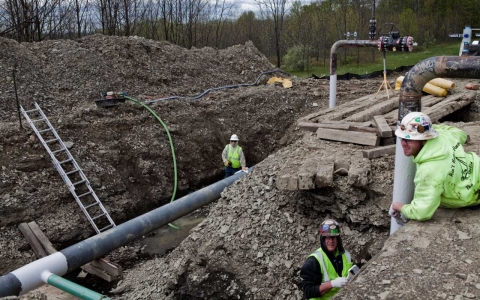North Carolina moved one step closer on Thursday to becoming the latest state to join the natural gas drilling rush sweeping the country.
The North Carolina Senate approved a bill that, if ratified by the House of Representatives and Gov. Pat McCrory, would lift a moratorium on hydraulic fracturing – also known as fracking – by July 2015.
While the amount of extractable gas known to be in North Carolina is much smaller than in many other states where fracking is legal, North Carolina politicians’ all-out embrace of fracking has ignited a firestorm of controversy.
Environmentalists say the bill – which would make disclosing proprietary fracking chemical mixtures a crime – shows how intent politicians are on pushing forward with the controversial extraction method, despite little support from the natural gas industry and mixed messages from the state’s citizens.
“Industry lobbyists aren’t even here pushing this bill,” said Mary Maclean Asbill, a senior attorney with the Southern Environmental Law Center. “The bill is solely being pushed by a group of legislators. They’re using the state’s time and energy to pass legislation for an industry that’s not even knocking on our door.”
Geologists estimate that North Carolina has at most a couple hundred thousand acres of natural gas-producing shale that could be developed through fracking – a process in which a mixture of chemicals and water are pushed deep into wells to break up gas-rich shale. That makes the state’s shale play much smaller than those of other gas-producing states. For example, the Marcellus shale formation, which is currently being developed in Pennsylvania and Ohio, is thought to contain 60 million acres.
This has left some North Carolinians confused. Why, they wonder, is the state’s Senate pushing so hard to lift a ban on gas drilling before its Mining and Energy Commission even has a chance to draft and receive comment on the rules that would regulate fracking in the state?
“In 2012 the Senate promised that the rules developed by the Mining and Energy Commission would be put in place before fracking was allowed,” said Dustin Chicurel-Bayard, the communications director of the North Carolina branch of the Sierra Club. “But since 2010, it’s the first time since the Civil War that Republicans control all three branches of government [in North Carolina]. Faster-moving policies are becoming the new norm.”
Supporters of the bill say that fracking will create thousands of jobs in economically depressed parts of the state. The American Chemistry Council, which represents chemical manufacturers (including those who make fracking chemicals) said legalizing fracking in North Carolina could create 15,000 jobs. Most other estimates put the number of jobs in the hundreds.
Supporters also say that fracking could make North Carolina, and the United States, less reliant on foreign oil.
While not giving his support outright to the Senate bill, Gov. McCrory said it was a step in the right direction.
“Harnessing our state’s onshore and offshore energy resources to create jobs in an environmentally responsible manner is a major legislative priority for the governor,” Josh Ellis, McCory’s spokesman, said in a statement. “The proposed legislation has several provisions that move North Carolina towards a safe and modern regulatory structure for oil and gas exploration.”
Environmentalists say the bill has a good chance of eventually passing the House and being signed by McCrory. But they hope that stringent limits will be crafted before then, and that some of the bill’s features will be quashed.
Anti-frackers secured a minor victory on Thursday, when the Senate removed a provision of the bill that would have made the state the country’s first to punish the unauthorized disclosure of fracking chemicals as a felony. The provision was replaced with an amendment that makes the disclosure a misdemeanor. That puts the North Carolina in line with other states that do not require fracking companies to disclose which chemicals they use in the process to disclose which chemicals they use in the process (PDF).
But even with the change, environmentalists are concerned that the rush to lift the ban will create more environmental problems than the potential economic boost is worth.
“The bottom line is this bill weakens clean water protections,” said Elizabeth Ouzts, the state director of nonprofit Environment North Carolina. “While (the industry) would be smaller than in other states, it’s still a threat.”

Fracking companies had been drilling off the coast of California since the late 1990s before regulators stepped in

An Associated Press investigation reveals pollution more widespread than industry experts claim






Error
Sorry, your comment was not saved due to a technical problem. Please try again later or using a different browser.